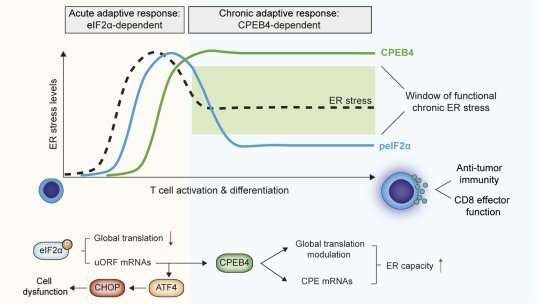
T lymphocytes are components of the immune system that are located in the tumor environment. They serve to identify and remove tumor cells. In order to perform this function, they must produce a large amount of secreted proteins, leading to chronic cellular stress.
A research team led by ICREA researcher Dr. Raúl Méndez at IRB Barcelona has revealed that the protein CPEB4 is essential for lymphocytes to be able to overcome stress. This capacity allows these cells to exert their antitumour function under the conditions of cellular stress that arise from their increased activity and the tumor environment itself. The study is published in The EMBO Journal.
“If we block CPEB4, T lymphocytes cannot handle the stress and they die, thus preventing them from halting tumor growth. Therefore, CPEB4 is a factor to take into account to guarantee the effectiveness of immunotherapy for the treatment of cancer,” explains Dr. Raúl Méndez, head of the Translational Control of Cell Cycle and Differentiation Laboratory at IRB Barcelona.
The microenvironment of the tumor is also a region where cellular stress is exacerbated by the lack of nutrients and oxygen caused by the rapid reproduction of cancer cells.
Acute stress vs. chronic stress
The most prevalent type of cell stress, known as “acute” cell stress, is intended to quickly resolve a possibly dangerous situation or eliminate the cell itself. In contrast, chronic stress is present in many physiological conditions, and it allows certain cellular functions to be carried out. An example is T lymphocytes, for which chronic stress is a necessary mechanism to cope with these situations.
“Interventions that enhance the adaptation of immune cells to chronic stress, rather than acute stress, would favor the immune response against tumors,” says Dr. Marcos Fernández-Alfara, first author of the article. Dr. Fernández-Alfara carried out this work as part of his Ph.D. studies at IRB Barcelona and he now works at Clarivate Analytics.
The study is based on previous work by Dr. Méndez’s team, which had already identified this new response to chronic cellular stress. The laboratory will focus future research lines on detailing how age and diet influence CPEB4 levels and, therefore, an adequate response to stress.
More information:
Marcos Fernández‐Alfara et al, Antitumor T‐cell function requires CPEB4‐mediated adaptation to chronic endoplasmic reticulum stress, The EMBO Journal (2023). DOI: 10.15252/embj.2022111494
Journal information:
EMBO Journal
Source: Read Full Article